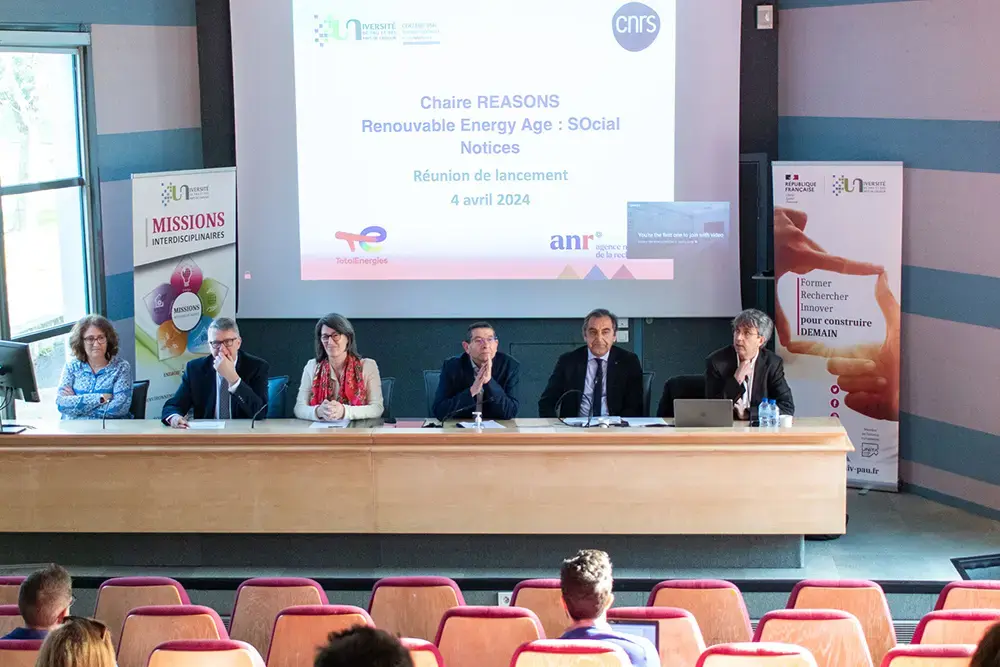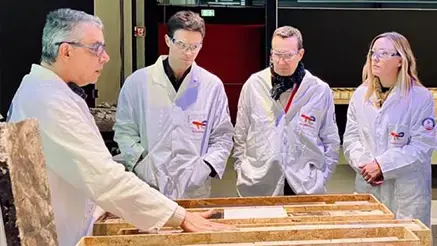- The REASONS (Renewable Energy Age: Social Notices) chair, supported by the UPPA, the CNRS and TotalEnergies, analyzes the debates surrounding renewable energies.
- A year after kick off, the chair has finalized as study on critical materials and begun another on sustainable aviation fuels.
- It has produced an initial version of a grid to assess the debates on energy transition technologies and has tested it for wind energy, CO2 capture and storage, green hydrogen and EV charge points.

Souheir Shahine, R&D Social Performance lead at TotalEnergies in Pau (CSTJF), looks back on the objectives of the REASONS chair (2023-2027). "It is a unique approach which aims to study the reaction of different target populations (citizens, politicians, NGO, industrialists, etc.) to renewable energies through different information sources such as social networks, the press and NGO campaigns. It’s a sizeable challenge for TotalEnergies as we want to understand how different technologies, from wind energy through solar power, biofuels and agrivoltaics are perceived so that we can propose solutions that take stakeholder concerns on board."
Several deliverables were finalized during the first year of the chair.
Critical and sensitive materials
An initial study was completed on "Critical raw materials for the energy transition: concept trend on a European scale (2008-2024). Industrial policy, climate control and sovereignty," signed by Xavier Arnauld de Sartre, Director of Research at the CNRS and Director of the Energy and Environmental Transitions laboratory (TREE) at the UPPA (University of Pau and the Pays de l’Adour) and one of its postdoctoral researchers. It covers a list of 34 critical materials defined by the European Union: helium, arsenic, scandium, barite, tantalum, vanadium, etc. Critical materials are those that are essential to different industries and technologies that have a high risk of supply-chain disruption. The authors pored over more than 2,700 newspaper articles and 19,000 web publications and finally re-focused the study on three of the most sensitive materials - lithium, rare earth elements (REE) and platinum - and three lithium production sites: the Barroso mine in the north of Portugal, the Jadar mine in Serbia and the Echassières mine in France. For TotalEnergies, it means incorporating social and environmental challenges across the entire critical materials value chain, from extraction to end of life, through different applications, ramping up transparency on the contribution of critical materials to the energy transition and low-carbon technologies, and guaranteeing that mining projects respect the principles of spatial justice, i.e., that certain regions - especially if they are already marginalized politically or in socio-economic terms - suffer disproportionate negative impacts generated by the transition of other regions or the general combat against global warming. This includes the fair distribution of socio-economic benefits for the impacted populations, in accordance with TotalEnergies’ environmental and CSR policy. Seven further studies are to be conducted by the REASONS chair, and one has already begun on SAFs (Sustainable Aviation Fuels), to be followed by studies on wind energy and agrivoltaics.
An assessment grid and two theses
In 2024, the team delivered an initial version of an innovative assessment tool - a grid designed to compare the content and status of debates around energy transition technologies on three levels: international, national and local; nine dimensions shared between technical, political, economic, spatial, environmental aspects and 27 questions. It can then be used by TotalEnergies teams to identify the risks and opportunities related to a new energy transition technology. During its first year, REASONS also hired two postdoctoral students. The first thesis, entitled "Greenwashing and Greenwishing in the age of renewable energies: focus on the oil industry," aims to improve understanding of the arguments given by advocates of these concepts, their strategies and their logic. The second thesis, entitled "The quantitative analyses of oppositions to transition technologies present on social networks," explores the use of Natural Language Processing (NLP) to monitor debates on transition technologies. This work complements the efforts made on the comparative grid, the idea being to investigate the possibility of mobilizing AI to help answer the assessment questions. "Understanding debates on renewable energies is a valuable basis for the decision-making process for our projects," Souheir Shahine concludes.

REASONS, societal debates in the age of renewable energies
The UPPA, the CNRS and TotalEnergies have created an industrial social sciences chair to analyze debates on the energy transition at an international level, in particular by exploring social networks.

CO₂ geological storage
The R&D team at TotalEnergies has been working for over twenty years on the development of CCS (Carbon Capture and Storage) to reduce its CO₂ emissions and those of its clients.

CSTJF: behind the scenes of excellence
Every year, hundreds of visitors - VIPs from all over the world: governmental authorities, national companies, different peers and partners, students, etc. come to tour the TotalEnergies Center in Pau.